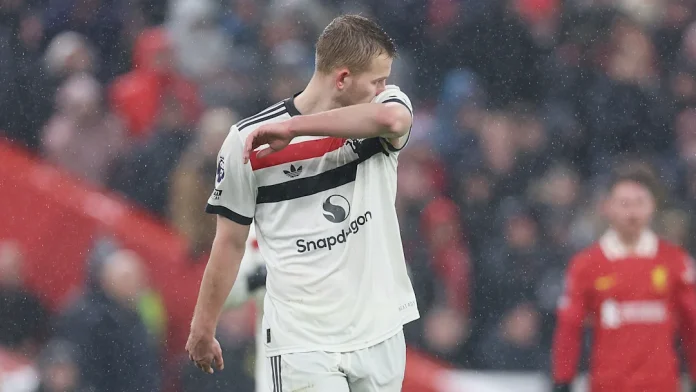Matthijs de Ligt’s handball incident during Manchester United’s 2-2 draw with Liverpool at Anfield has sparked heated discussions across the football world.
The decision to penalize the Dutch defender, following a VAR review, handed Liverpool a crucial opportunity to level the game. Mohamed Salah made no mistake, converting the penalty despite a valiant effort from United goalkeeper Andre Onana.
The Premier League later clarified the rationale behind the decision, emphasizing that De Ligt’s arm was in an unnatural position, which warranted the overturn of referee Michael Oliver’s initial call. This pivotal moment encapsulates the fine margins of modern football, where VAR technology continues to play a decisive role.
The incident occurred in the 67th minute when Alexis Mac Allister’s header struck De Ligt’s raised arm inside the penalty area. Despite immediate and fervent appeals from Liverpool players and a vociferous Anfield crowd, Oliver waved play on.
However, the Video Assistant Referee (VAR) intervened, recommending an on-field review. After consulting the pitch-side monitor, Oliver reversed his decision and awarded a penalty to Liverpool. Salah coolly slotted it past Onana, securing a critical goal for the Reds in a tightly contested match.
A statement from the Premier League clarified:
“#LIVMUN – 67’ VAR OVERTURN. VAR recommended an on-field review for a possible handball by De Ligt, deeming that his arm was raised in an unnatural position. Upon review, the referee overturned his original call of no penalty.”
Why De Ligt Was Penalized
Under current handball regulations, a player can be penalized if their arm is deemed to be in an unnatural position, especially if it increases the surface area of their body and blocks the ball’s trajectory. In De Ligt’s case, the raised arm left little room for interpretation.
Sky Sports commentator Gary Neville aptly summed up the situation:
“As soon as your arm is high like that in the box, you are asking for big trouble. Why is his hand there? I don’t know why his hand is there at all.”
Despite this, the decision has divided opinion among fans and pundits, with some arguing that the handball rules lack consistency and clarity.
De Light handball and Liverpool wins penalty
— Pau Cubarsí (fan) (@PauCubarsiFCB) January 5, 2025
This incident marked a blemish on what was otherwise a solid performance from Matthijs de Ligt. The Dutchman, who joined Manchester United in the summer, has experienced a mixed start to his career at Old Trafford. While he has showcased his defensive prowess in several games, moments like this underscore the challenges of adapting to the fast-paced Premier League.
De Ligt’s ability to bounce back from such setbacks will be crucial as he aims to cement his place in Rúben Amorim’s evolving squad.
Despite the disappointment of conceding the penalty, Manchester United displayed significant improvement under Rúben Amorim. The Red Devils were organized, disciplined, and far more assured in possession than in previous matches.
Key midfield duo Manuel Ugarte and Kobbie Mainoo put in commanding performances, effectively nullifying Liverpool’s midfield trio of Mac Allister, Curtis Jones, and Ryan Gravenberch. Their energy and composure provided a solid foundation for United to build upon.
Captain Bruno Fernandes was another standout performer. In one of his best displays this season, Fernandes dictated the tempo of the game, creating chances and showcasing leadership qualities that have been questioned in recent weeks.
ALSO READ:
Amorim’s tenure at Manchester United began under challenging circumstances, with the team struggling for consistency and cohesion. However, the draw at Anfield offers a glimmer of hope for United fans.
Climbing to 13th place in the Premier League table, United moved above West Ham and showed signs of resilience and tactical discipline that had been missing earlier in the season. Although European qualification remains a distant goal, the performance against Liverpool suggests brighter days ahead.
VAR’s Growing Influence
The controversy surrounding the penalty reignites the debate over VAR’s role in football. While the technology aims to bring fairness and accuracy to the game, its implementation often leaves fans and players frustrated.
De Ligt’s penalty incident highlights the subjective nature of handball decisions. What constitutes an “unnatural position” remains open to interpretation, leading to inconsistencies across matches.
For Manchester United, the focus now shifts to learning from such moments and maintaining their upward trajectory under Amorim’s guidance.
From Liverpool’s point of view, the penalty was a lifeline in a match where they struggled to break down United’s organized defense. Salah’s composure from the spot underscored his importance to Jürgen Klopp’s side, as he continues to deliver in crucial moments.
The draw leaves Liverpool still in the hunt for a top-four finish, though they will be disappointed not to have capitalized on their home advantage.
Matthijs de Ligt’s handball and the subsequent penalty decision will remain a talking point in the aftermath of the thrilling 2-2 draw at Anfield. For Manchester United, the incident serves as a learning moment in a season of rebuilding under Rúben Amorim.
Despite the controversy, United’s performance showed promise, with key players stepping up and Amorim’s tactical adjustments beginning to bear fruit. As the team looks to climb the Premier League table, their focus will be on turning these encouraging displays into consistent results.
For Liverpool, the match highlighted their resilience, as they fought back to earn a point. However, questions remain about their ability to dominate games against organized opponents.
In a season where every point matters, the Anfield clash reminded fans of the unpredictable drama that makes football so compelling.




